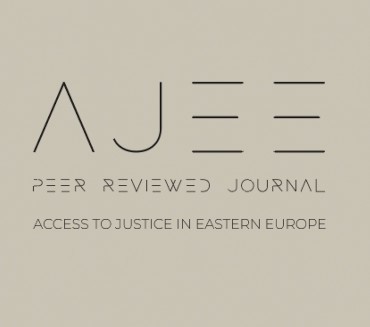ABOUT ISSUE 1 OF 2025
At Access to Justice in Eastern Europe (AJEE), our mission remains steadfast: to enhance global understanding of Eastern Europe’s legal, social, and political landscapes, and to advance open science and research ethics in scholarly publishing. We believe in promoting rigorous, interdisciplinary inquiry that not only illuminates the realities of legal systems in transition but also shapes constructive dialogue on achieving just and equitable outcomes for individuals and communities. Our commitment extends to nurturing the next generation of legal scholars, ensuring that new voices are heard, and that high-quality research is accessible to readers around the world, free of charge.
In this issue, we are pleased to present several significant contributions, among which I highly recommend the following publications.
In his article, “International Relations and Its Effect on Enforcement of International Law: The Case Studies of Ukraine and Syria,” Mohamad Almohawes critically explores how external alliances and geopolitical considerations can either hinder or facilitate the application of international legal norms in conflict zones. By highlighting the situations in Ukraine and Syria, the author underscores the influential role of powerful state actors in shaping—sometimes stalling—mechanisms intended to address human rights violations. This piece offers invaluable insights for policymakers, academics, and practitioners seeking to reinforce the rule of law in turbulent environments.
In “The Doctrine of Limited Government in the Legal Positions of the Constitutional Court of Ukraine,” a team of co-authors—Tetiana Slin’ko, Yevhenii Tkachenko, Liubomyr Letnianchyn, and Serhii Fedchyshyn—focuses on the cornerstone principle of constitutionalism: limiting state power to protect individual rights. Examining key decisions rendered by the Constitutional Court of Ukraine, the authors demonstrate how the Court consistently upholds the separation of powers, reinforcing democratic governance and emphasizing the importance of robust institutional checks. Their work serves as a valuable resource for scholars of constitutional law and anyone interested in the evolution of Ukrainian constitutional jurisprudence.
A highly valuable contribution from Kazakh colleagues, “On Manoeuvring Kazakhstan’s Criminal Law in Defining Torture and Other Cruel, Inhumane, and Degrading Treatment and Punishment,” by Elena Mitskaya, Kurmangaly Sarykulov, and Kanat Utarov illuminates systemic weaknesses that enable torture and ill-treatment in Kazakhstan. They advocate for clearer legislative definitions and alignment with international human rights standards, revealing how ambiguous references to “official capacity” and other loopholes can perpetuate abusive practices. This research ultimately calls for both domestic and international stakeholders to drive reforms toward more accountable governance.
In “Preemptive Self-Defence in Public International Law: An Analysis Through the Lens of International Court of Justice Jurisprudence,” Zaid Ali Elgawari tackles the contentious issue of anticipatory or preemptive force under Article 51 of the UN Charter. Through examinations of seminal cases such as Nicaragua v. United States and contemporary conflicts like the one in Ukraine, the author probes the boundaries of necessity and proportionality in self-defence claims. This contribution not only enriches scholarly debates on the legal use of force but also provides a framework for evaluating state actions within evolving geopolitical contexts.
Lastly, I would like to specifically welcome the article, “Punishability in Radioecological Safety: Case Law from Ukraine,” authored by Anastasiia Ternavska, a young researcher from Ukraine. We are very pleased to provide her with a free-of-charge Open Access publication opportunity, reflecting our ongoing commitment to supporting emerging scholars. In her study, Ternavska addresses an underexplored area of Ukrainian criminal law, exposing the discrepancy between punitive legal provisions and their actual enforcement in the realm of radioecological safety. By analyzing judicial data and practices, the author reveals the over-penalization embedded in current legislation and proposes targeted revisions. Her findings prove especially valuable to lawmakers, practitioners, and researchers striving to balance effective deterrence with proportionality in criminal sentencing.
As always, I would like to take this opportunity to extend my deepest gratitude to our Managing Editors, Peer Reviewers, Language Editors, and Production Service teams, whose dedication, expertise, and meticulous efforts ensure the scholarly integrity and overall quality of AJEE. Their tireless work—ranging from rigorous review processes to careful editorial oversight—has been essential in bringing this issue to fruition and upholding our publication standards.
We are delighted to present our new cover, created by Alona Hrytsyk, which visually resonates with the cyclical patterns of existence—generations come and go, the sun rises and sets, and the wind traces its circular routes. In contemplating the reflections from Ecclesiastes on these unceasing cycles, I am reminded that while life’s patterns often repeat, we also encounter moments of profound transformation. This concept lies at the heart of a paradigm shift: as we navigate well-worn paths, our fundamental understanding can—and must—change.
In recent days, as reality has formed a new paradigm for our lives, I have found that embracing the idea of such a shift may be key to our ability to adapt. We extend our sincere thanks to Alona Hrytsyk for capturing this delicate interplay between constancy and disruption. May her design serve as a reminder that, even amid life’s familiar rhythms, the potential for radical renewal is always present—and perhaps the very essence of the answer we seek. At the same time, it is crucial to uphold our most fundamental principles, ensuring we preserve what we have so that we may continue to live—and pass on a strong foundation to future generations.
Finally, we are delighted to announce updates to our Editorial Board and the expansion of our network of Section Editors. By welcoming new members with diverse specializations, we continue to refine our peer-review procedures and foster interdisciplinary collaboration, all with the aim of delivering the highest-quality content to our readers. We are committed to growing and adapting in order to remain a leading forum for cutting-edge legal scholarship, and we look forward to the insights this expanded team will bring in future issues of AJEE.

